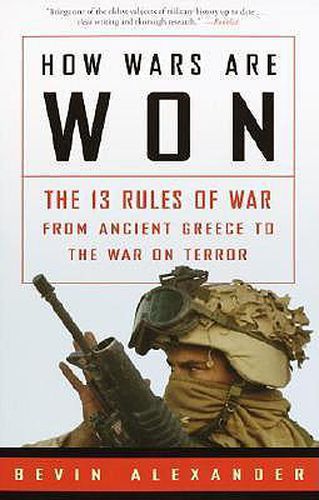Readings Newsletter
Become a Readings Member to make your shopping experience even easier.
Sign in or sign up for free!
You’re not far away from qualifying for FREE standard shipping within Australia
You’ve qualified for FREE standard shipping within Australia
The cart is loading…






HOW WARS ARE WON introduces readers to the 13 rules of warfare and shows how throughout history, military victory has depended upon the successful application of these rules. The book also shows that knowing which of these rules to follow, and how to adapt them to the current challenges, will prove decisive in the war against terrorism.
Military historian Bevin Alexander devotes a chapter to each rule, and for each he offers riveting accounts of four or five battles that were won or lost because of either the successful or unsuccessful application of that rule. One of these rules is that of the feigned retreat: pretend to be defeated, feign a retreat, and then ambush your enemy when they pursue you. This rule is especially relevant to guerilla-style warfare, and was used to devastating effect by the North Vietnamese against US forces in the Vietnam War.
The battles included are bom famous and little known, and they range from the time of Alexander the Great up through the 20th century. Along the way, Alexander profiles the greatest military commanders, such as Genghis Khan, Napoleon, Stonewall Jackson (whom he identifies as a better general than Robert E. Lee), Erwin Rommel, a.k.a. the Desert Fox, and George Patton. The book also tells the fascinating story of the ways in which new technologies have created new opportunities and challenges in warfare and how they have been used to brilliant effect by some commanders and to horrible effect by others.
Alexander emphasizes that even as the technolog that even heading into this new 21st century-styl tactics with which to win. ry of war constantly changes, the underlying rules of engagement remain the same, and e war, we can use the lessons of history to guide us in shaping the new strategies and tactics with which to win.
$9.00 standard shipping within Australia
FREE standard shipping within Australia for orders over $100.00
Express & International shipping calculated at checkout
Stock availability can be subject to change without notice. We recommend calling the shop or contacting our online team to check availability of low stock items. Please see our Shopping Online page for more details.
HOW WARS ARE WON introduces readers to the 13 rules of warfare and shows how throughout history, military victory has depended upon the successful application of these rules. The book also shows that knowing which of these rules to follow, and how to adapt them to the current challenges, will prove decisive in the war against terrorism.
Military historian Bevin Alexander devotes a chapter to each rule, and for each he offers riveting accounts of four or five battles that were won or lost because of either the successful or unsuccessful application of that rule. One of these rules is that of the feigned retreat: pretend to be defeated, feign a retreat, and then ambush your enemy when they pursue you. This rule is especially relevant to guerilla-style warfare, and was used to devastating effect by the North Vietnamese against US forces in the Vietnam War.
The battles included are bom famous and little known, and they range from the time of Alexander the Great up through the 20th century. Along the way, Alexander profiles the greatest military commanders, such as Genghis Khan, Napoleon, Stonewall Jackson (whom he identifies as a better general than Robert E. Lee), Erwin Rommel, a.k.a. the Desert Fox, and George Patton. The book also tells the fascinating story of the ways in which new technologies have created new opportunities and challenges in warfare and how they have been used to brilliant effect by some commanders and to horrible effect by others.
Alexander emphasizes that even as the technolog that even heading into this new 21st century-styl tactics with which to win. ry of war constantly changes, the underlying rules of engagement remain the same, and e war, we can use the lessons of history to guide us in shaping the new strategies and tactics with which to win.